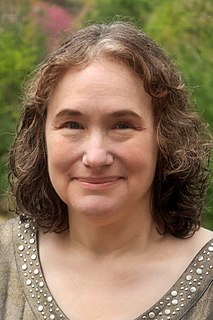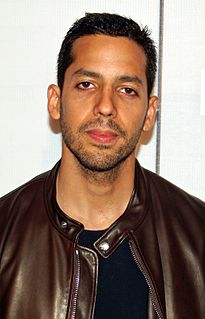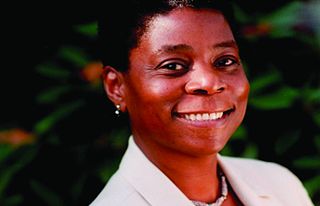A Quote by Daniel Mendelsohn
I would argue, for perspective's sake, that the arc of a really literary work is precisely that it both intensely reflects, and simultaneously transcends the conditions of its making. I would say that is the difference between literature and other kinds of writing. That is what the literary is - it ultimately doesn't matter what his circumstances were. And the thing that you were just saying about being sympathetic to Brontë and the fact that she could only write what she wrote when she wrote it... that's true. But look at that novel, which means so much to so many people.
Quote Topics
About
Arc
Argue
Being
Between
Both
Circumstances
Conditions
Could
Difference
Fact
His
Intensely
Just
Just Sayin
Just Saying
Kinds
Literary
Literature
Look
Making
Many
Matter
Means
Much
Novel
Only
Other
People
Perspective
Precisely
Really
Reflects
Sake
Say
Saying
She
Simultaneously
So Many People
Sympathetic
Thing
Transcends
True
Ultimately
Were
Which
Work
Would
Write
Writing
Wrote
Related Quotes
The techniques are all means of dealing with one simple idea: She wrote it. (That is, the "wrong" person--in this case, female--has created the "right" value--i.e., art.)
Denial of Agency: She didn't write it.
Pollution of Agency: She shouldn't have written it.
Double Standard of Content: Yes, but look what she wrote about.
False Categorizing: She is not really she [an artist] and it is not really it [serious, of the right genre, aesthetically sound, important, etc.] so how could "she" have written "it"?
Or simply: Neither "she" nor "it" exists (simple exclusion).
If she took Po as her husband, she would be making promises about a future she couldn't yet see. For once she became his wife, she would be his forever. And, no matter how much freedom Po gave her, she would always know that it was a gift. Her freedom would be not be her own; it would be Po's to give or to withhold. That he never would withhold it made no difference. If it did not come from her, it was not really hers.
[Grandfather] would manufacture funnies with Grandmother before she died about how he was in love with other women who were not her. She knew it was only funnies because she would laugh in volumes. 'Anna,' he would say, 'I am going to marry that one with the pink hat.' And she would say, 'To whom are you going to marry her?' And he would say, 'To me.' I would laugh very much in the back seat, and she would say to him, 'But you are no priest.' And he would say, 'I am today.' And she would say, 'Today you believe in God?' And he would say, 'Today I believe in love.
Sometimes she wished for someone she could tell about her problems, just to be able to say, ‘I’m in love with a man and I can’t have him.’ But that would only lead to questions she couldn’t answer, so she kept the secret and the pain inside, hoping someday she would no longer feel as if half of her were missing.
She was looking into my eyes with that way she had of looking that made you wonder whether she really saw out of her own eyes. They would look on and on after every one else's eyes in the world would have stopped looking. She looked as though there were nothing on earth she would not look at like that, and really she was afraid of so many things.
I was reading Emily Dickinson and Edwin Arlington Robinson, but these weren't the poets that influenced me. I think Gwendolyn Brooks influenced me because she wrote about Chicago, and she wrote about poor people. And she influenced me in my life by giving me a blurb. I would see her in action, and she listened to every single person. She didn't say, "Oh, I'm tired. I gotta go." She was there, and present, with every single person. She's one of the great teachers.
Anais Nin shows an occasional grace in writing, but her work is quite foreign to me, precisely because she wants so much to be feminine and not feminist. And then she is so gaga before so many men. She talks about men I know in France, men who were less than nothing, and she considers them kings, extraordinary people.
That queen, of error, whom we call fancy and opinion, is the more deceitful because she does not always deceive. She would be the infallible rule of truth if she were the infallible rule of falsehood; but being only most frequently in error, she gives no evidence of her real quality, for she marks with the same character both that which is true and that which is false.
Under Sharia law, If a woman has money, she can invest her money. The thing is, what we are concerned about is, in the public arena, there's a difference between a man and a woman. We would have complete segregation in the public arena, but other than that, if she wants to go to the market, if she wants to go to visit her relatives or for medicine or for education. There's a whole host of reasons why she would be out and about but, what we are saying is she not obliged to work. That is the job of the man.
He began to trace a pattern on the table with the nail of his thumb. "She kept saying she wanted to keep things exactly the way they were, and that she wished she could stop everything from changing. She got really nervous, like, talking about the future. She once told me that she could see herself now, and she could also see the kind of life she wanted to have - kids, husband, suburbs, you know - but she couldn't figure out how to get from point A to point B.
For they might be parted for hundreds of years, she and Peter; she never wrote a letter and his were dry sticks; but suddenly it would come over her, If he were with me now what would he say? --some days, some sights bringing him back to her calmly, without the old bitterness; which perhaps was the reward of having cared for people; they came back in the middle of St. James's Park on a fine morning--indeed they did.
She looked at a silver birch: it would have a soft, showery voice and would look like a slender girl, with hair blown all about her face and fond of dancing. She looked at the oak: he would be a wizened, but hearty, old man with a frizzled beard and warts on his fact and hands, with hair growing out of the warts. She looked at the beech under which she was standing. Ah! --she would be the best of all. She would be a gracious goddess, smooth and stately, the Lady of the Wood.

































